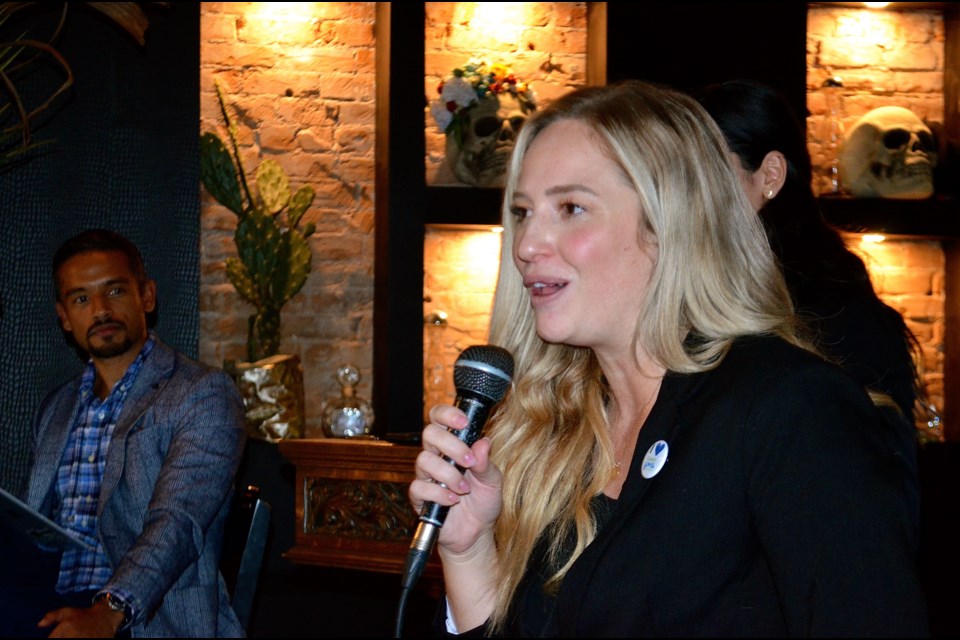Individuals as well as representatives from business, government and non-profit organizations gathered early Tuesday morning to inspire and celebrate each other’s generosity during the year.
The 5th Annual GuelphGives Community Leaders Breakfast was a Giving Tuesday event organised by GuelphGives of the United Way Guelph Wellington Dufferin
“The breakfast is a springboard for an entire day of give back and the giving season so we are jumping into 2020 pretty strong,” said Emma Rogers, GuelphGives committee chair. “As I look out over this group of people, I know that you are all giving back and I could probably go to every one of you and tell a story about what you are doing. Some of you just hiked across a desert for women’s shelters. Some of you opened a business and had proceeds go back into the community.”
The event was recorded for a podcast that will be posted on the Guelph Chamber of Commerce, Guelph Kids and Openly websites.
“How many of you consider yourselves heroes today?” asked event host Rishan Sathasivam, manager of corporate finance and innovation at MarshallZehr.
“I didn’t expect many of you to put your hand up because giving isn’t really about ego, acknowledgment or social media engagement. It’s about giving back and providing support without getting anything in return.”
Sathasivam warmed up the audience before he introduced speakers, Kris Cummings, chief partnership officer for social impact consulting firm, Openly, and Shakiba Shayani, president and CEO of the Guelph Chamber of Commerce.
Their presentation came in the form of a conversation between Shayani and Cummings followed by a Q&A session with the audience.
“We know what Black Friday is and we know what Cyber Monday is and we know that Giving Tuesday has emerged as a response that focuses on the importance of giving back,” said Shayani. “It acknowledges that the residents and businesses of every community can get involved for the good of their community.”
She said that Guelph faces many of the same challenges as other cities its size.
“Guelph is a great place to live and work, but we still face some serious issues,” said Shayani. “Affordability as it relates to living, business and housing is a serious issue in our city and our region. Likewise, food security, addictions, mental health, the environment and certainly the equitable access to opportunities to participate in arts, culture and recreation. We know we can respond to these challenges.”
Addressing these issues requires people to commit their time and money but there is more to it than that.
“I don’t think anyone in the room would agree that just spending time and money is the extent of it, but I think it is where we start,” said Cummings. “I think that we know it is not just about giving on a day like Giving Tuesday.”
People tend to be more generous at this time of the year and the challenge, said Cummings, is to sustain that generosity and commitment year-round.
“I don’t think single-day volunteerism or one-time small donations are bad,” said Cummings. “I think the motivations are good and the contributions are really helpful. Often single-day volunteers and one-time donors go on to become long-term volunteers, donors and advocates.”
Public perception is often a significant factor when it comes to getting people involved long-term.
“One of the biggest barriers to involvement is that not everyone is asked and beyond that people in businesses don’t always know where to start or, when they do, their efforts can be perceived as a drop in the bucket when it comes to massive community issues,” he said. “It attracts more involvement if those drops in a bucket are contributing to a clear and bigger plan that everyone can see and understand they are part of something bigger.”
He pointed to minor sports organisations as a successful model that requires collaboration from a variety of volunteers, experts, businesses and local government.
“Part of the solution is being really purposeful and planful in three ways,” said Cummings. “First involve people in ways that matter and that they are individually passionate about. Second, involve people in ways that immediately and noticeably make a concrete difference in some way so everyone can see the results of their efforts. Last, involve people in ways that combine with other people’s contributions for an even bigger impact together.”
He said that people are more inclined when they feel they are part of something important that is “bigger than ourselves”.
He cited a Harvard Business School concept for planning and inspiring people to get involved.
“It balances three points,” he said. “At any given time, we only have a certain capacity to get anything done. We have to do things that matter to the public. We need to get people to define and create what they value. When that value is clearly defined it attracts more support and involvement. That is the glue for people and that creates more capacity for doing good.”
It all starts with raising awareness, education and providing good leadership.
“We really do have the leaders in this room,” said Rogers. “We really show what we can accomplish when we all come to the table together.”

.png;w=120;h=80;mode=crop)

